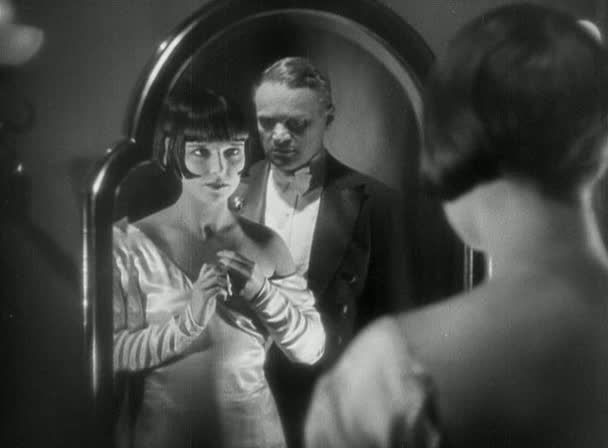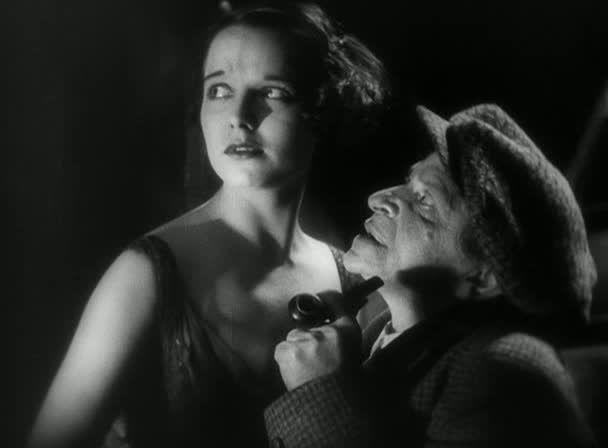
Pandora's Box was director Georg Wilhelm Pabst's first collaboration with actress Louise Brooks, who the director had discovered in Howard Hawks' A Girl in Every Port. As in that film, Brooks is a template for the femme fatale, a seductress who leads men into temptation and self-destruction while, strangely enough, retaining her own almost childlike innocence. Her character in Pabst's film, Lulu, was Brooks' most enduring and iconic creation, the part for which she will always be remembered. Pabst's film is built around her, and it succeeds almost entirely because Pabst is so adept at highlighting and channeling the actress' magnetic charm, her absolutely unparalleled ability to light up a screen with the sheer beauty and poignancy of her face.
Brooks' charisma is so vital to the film because Lulu could have been a very unappealing character if embodied by a less iconic actress. Lulu is a prostitute and aspiring dancer, a frivolous and cheery woman who's totally unconcerned with morals. When her latest wealthy lover, Dr. Schön (Fritz Kortner), tells her at the beginning of the film that he's getting married to someone else, she shrugs and tells him that's no reason not to kiss her. Lulu's all about pleasure, and about living in the moment: when she's with a man, her casual intimacy and ready smiles convey the impression that he's the only man in the world, but she's able to easily skip from one man to the next, turning that radiant charm on each in turn, without any compunctions about her amoral behavior. The film's opening scenes quickly convey what this woman is about, as she cheerfully parts with one of her clients, acting tender and accommodating with him until the moment that her beloved old "patron" Schigolch (Carl Goetz) shows up, at which point the client is forgotten as Lulu pours her affection onto her former pimp instead. And then, when Schön arrives, Lulu just tucks Schigolch in a corner and devotes herself to the doctor. The whole sequence is like seeing a microcosm of Lulu's serial bed-hopping, her whole life condensed into a few minutes.
Schön is a respectable upper-class man who knows all too well that his affair with Lulu is tainting his reputation, but he can't quite manage to disengage himself; even when he finally breaks off his affair with Lulu to marry a woman of his own class, he remains involved with Lulu's life, managing the variety show that marks Lulu's debut as a dancer. Schön repeatedly says that his affair with Lulu will lead to his death, driving home the foreshadowing of his end, and the knowledge of it weighs heavy on him, making him a lugubrious counterpoint to the sprightly and carefree Lulu.
Indeed, Lulu can seem downright cold-hearted in her selfishness. After the film's central tragedy, Lulu returns to the house Schön had kept for her, and far from seeming distraught by what had happened, she's delighted to be reunited with her clothes and possessions, happily rifling through her closet and posing in front of a mirror. While she ignores the meaning of this place and what had happened here, Pabst keeps highlighting the tragedy by calling attention to a striking sculpture of a woman twisted into a pose of suffering and prayer, a piece of art that had hovered portentously in the background of the earlier scenes of tragic violence. The woman, with her short hair echoing Lulu's distinctive bob-cut, seems like a foreboding sign of what's in store for the film's heroine, though Lulu, despite being a victim as often as an instigator, rarely seems to suffer, not truly — most of the time, she uses her tears and her tantrums as a tool, a way to sway men to her cause.


Despite that calculating streak, Lulu never seems really evil, just self-absorbed, and at times genuinely unaware of the volcanic effect that she can have on men. When she's placed on trial halfway through the film, the prosecuting lawyer compares her to Pandora, beautiful and irresistible but possessing a box full of evil that she somewhat haplessly unleashes upon the world. It's an apt comparison, because Lulu doesn't fully understand what she's doing to those around her, in part because she's not thinking about them — she only cares about her own comfort and happiness. Because she laughs it off every time she's caught in an indiscretion, she expects everyone else to be similarly accommodating.
And yet there's also an undercurrent of deeper emotion within Lulu, whose childlike emphasis on constant pleasure seems to stem from a fear of what might have happened if she stopped having fun for a moment. There's a definite desperation to Lulu's constant pleasure-seeking, which is explained several times in terms of her difficult childhood. Her most poignant scene is probably her trial, in which Pabst and Brooks cleverly suggest everything about Lulu's mental state through her manipulations of the thin veil she wears. Lulu feels the eyes of the crowd on her and instinctively pulls her veil down over her face, hiding from them, for once unhappy to be the center of attention. Mere moments later, though, she stands and holds the veil away from her face to deliver an impassioned plea for her innocence, and then, in a remarkable shot, she lets the veil fall back over her face as she sits down, the veil fluttering around her face as she gracefully descends. This simple moment is utterly poetic and beautiful, abstractly suggesting the effect of this situation on Lulu. Pabst also locates a strangely melancholy, even almost romantic, vibe in the film's closing scenes, when Lulu encounters the sinister but handsome Jack the Ripper (Gustav Diessl) prowling the London streets. Lulu's appeal is so enticing that she even, for a time at least, calms the bloodlust of the notorious killer, and these scenes are infused with an unsettling tenderness, as though there's a deep and surprising connection between the notorious killer and the sweet, smiling prostitute who now seems sadder than ever behind her smile.
Pandora's Box is justifiably known as the defining role of Brooks' career. Pabst and Brooks would follow up this success with the equally great Diary of a Lost Girl, in which Brooks would play a more purely innocent suffering woman rather than the complicated mix of naïveté and conniving that she embodies here. Brooks' Lulu is a woman in trouble, a troubled woman, or maybe just trouble, but there's no question that she's utterly mesmerizing to watch, and Pabst perfectly captures her luminous qualities. The film's melodramatic narrative, which puts Lulu through a series of increasingly demeaning tragedies, is balanced by the combination of realism and stylized glamour in Pabst's aesthetic, making this one of the great collaborations between a director and an actress.

2 comments:
Yes Ed, this is absolutely one of the greatest of all collaborations between a director and actress, though Brooks herself matches her work here with DIARY OF A LOST GIRL, and Pabst's greatest film may still be THE JOYLESS STREET. But it's apples and oranges, as this is a landmark work of German expressionism, imbued as it is with a haunting melancholy. You do a fantastic job investigating Lulu, and how Brooks makes her one of the screen's most unforgettable characters with charisma to spare. The Criterion of the film is a must-own.
Intriguing exploration of a character I tend to see as pure erotic energy; still you elaborate on her complexities quite well. Definitely one of my favorite silents; Brooks is irresistible.
Post a Comment